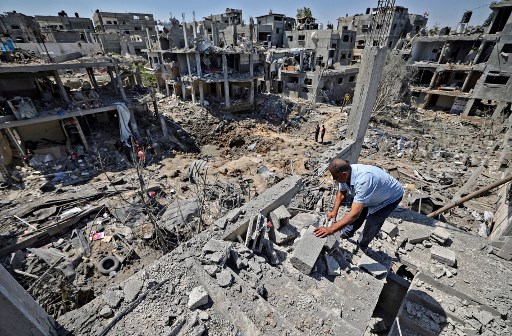Israel pounds Gaza as deadly conflict intensifies
Friday May 14 2021

Palestinians assess the damage caused by Israeli air strikes, in Beit Hanun in the northern Gaza Strip, on May 14, 2021 (AFP)
Israel bombarded Gaza with artillery and air strikes on Friday following a new barrage of rocket fire from the Hamas-run enclave, intensifying a conflict that has now claimed 127 lives.
The Israeli army said its overnight operation involved fighter jets and tanks hitting a Hamas tunnel network dug under civilian areas.
It said it "wasn't feasible this time" to forewarn civilians as it did ahead of strikes on Gaza tower blocks earlier this week.
The bombardment saw huge fireballs turn the night sky orange as explosions rocked the ground.
Several homes in densely populated Gaza were destroyed or heavily damaged, AFP correspondents reported while rockets tore through the skies towards Israel.
Muhammad Najib, a 16-year-old resident of Gaza City's Rimal neighbourhood, compared the bombing to a video game. "It's like a horror film," he said.
The most intense fighting since 2014 between Israel and Palestinian militants in Gaza has also seen Israeli soldiers massing on the edge of the blockaded territory.
Army spokesman Jonathan Conricus on Friday took responsibility for an erroneous overnight report that ground forces had entered Gaza, but confirmed ground troops had taken part in an operation carried out from Israeli territory targeting tunnels dug under the border.
"There are no... ground troops inside Gaza at the moment," he said.
The conflict has killed 119 Palestinians, including 31 children, and wounded more than 830, Gaza's health minister said.
An Israeli woman in her 80s died overnight from injuries sustained while seeking shelter from rocket fire, bringing the toll on the Israeli side to eight dead, including a six-year-old boy and a soldier.
- Immediate de-escalation -
Israeli security forces have also been scrambling to contain deadly riots between Jews and Arabs, and rockets have been fired from Lebanon.
The United Nations said the Security Council would meet on Sunday to address the conflict as Secretary General Antonio Guterres called for a "cessation of hostilities".
US Secretary of State Antony Blinken said Washington was "deeply concerned about the violence in the streets of Israel", and the State Department urged citizens to "reconsider travel to Israel".
Several international airlines -- including KLM, British Airways, Virgin, Lufthansa and Iberia -- cancelled flights amid the aerial onslaught.
Since Monday, Palestinian militant groups have fired more than 1,800 rockets towards Israel, mostly towards southern cities, but also at Tel Aviv and Jerusalem.
Hundreds have been intercepted by the Iron Dome defence system.
Israel has hit roughly 750 sites it described as military targets such as Hamas bomb-making facilities and the homes of senior militant commanders.
It estimates that more than 30 leaders of Hamas and its ally Islamic Jihad have been killed.
Three tower blocks in Gaza have been levelled.
The heavy bombardments coincided with the start of Eid al-Fitr, which marks the end of the Muslim holy fasting month of Ramadan, and saw the faithful pray at mosques and amid the rubble of Gaza's collapsed buildings.
Three rockets were also fired from southern Lebanon towards Israel, landing in the Mediterranean Sea, the Israeli army said.
A source close to Israel's arch-enemy Hezbollah said the Lebanese Shiite group had no link to the incident.
- 'Preventing pogroms' -
With the conflict showing no signs of easing, Israel has been rocked by an unprecedented wave of mob violence, in which both Arabs and Jews have been savagely beaten and police stations attacked.
Defence Minister Benny Gantz ordered a "massive reinforcement" to suppress the internal unrest.
The disturbances, in which riot police had repeatedly clashed with Palestinians, has been driven by anger over the looming evictions of Palestinian families from the Sheikh Jarrah neighbourhood of east Jerusalem.
The surging tensions sparked clashes in many of Israel's mixed towns where Jews live alongside Arabs, who make up about 20 percent of the country's population.
More than 750 people have been arrested this week, including more than 100 overnight, police spokesman Micky Rosenfeld said.
Officers detained Jewish Israelis "walking around looking for trouble" in Netanya and Beersheba, while Arab citizens attacked police with petrol bombs, he added.
In Lod, where an Arab man was shot dead by a Jewish Israeli on Monday, the outside of a synagogue was burnt overnight while 43 people were arrested, Rosenfeld told AFP.
In one of the most shocking episodes of the intercommunal violence, a far-right mob beat a man they considered an Arab in Bat Yam, near Tel Aviv on Wednesday, leaving him with serious injuries.
Prime Minister Benjamin Netanyahu said police were increasing their use of force, warning of the "option" of deploying soldiers in towns.
Netanyahu said the violence was "unacceptable".
"Nothing justifies the lynching of Arabs by Jews, and nothing justifies the lynching of Jews by Arabs," he said, adding Israel was fighting a battle "on two fronts".
Amid the rocket fire, Israel's civil aviation authority said it had diverted all incoming passenger flights headed for Tel Aviv's Ben Gurion airport to Ramon airport in the south.
Hamas announced it had also fired a rocket at Ramon in a bid to stop air traffic to Israel.
The military escalation was triggered by weekend unrest at Jerusalem's Al-Aqsa mosque compound, which is sacred to both Muslims and Jews.


